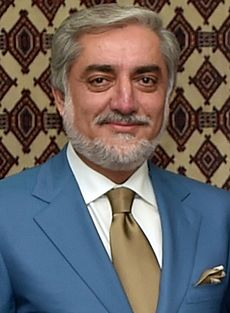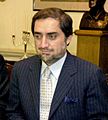Abdullah Abdullah facts for kids
Quick facts for kids
Abdullah Abdullah
|
|
|---|---|
|
عبدالله عبدالله
|
|
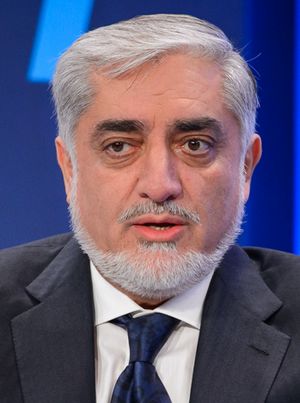
Abdullah in 2017
|
|
| Chairman of the High Council for National Reconciliation | |
| In office 30 May 2020 – 15 August 2021 |
|
| President | Ashraf Ghani |
| Preceded by | Office established |
| Succeeded by | Office abolished |
| Chief Executive of Afghanistan | |
| In office 29 September 2014 – 9 March 2020 |
|
| President | Ashraf Ghani |
| Deputy | Khyal Mohammad Mohammad Khan Mohammad Mohaqiq |
| Preceded by | Position established |
| Succeeded by | Position abolished |
| Minister of Foreign Affairs | |
| In office 13 November 2001 – 20 April 2005 |
|
| President | Hamid Karzai |
| Preceded by | Abdul Rahim Ghafoorzai |
| Succeeded by | Rangin Dadfar Spanta |
| Leader of the National Coalition of Afghanistan | |
| In office 18 March 2010 – 15 August 2021 |
|
| Preceded by | Position established |
| Succeeded by | Position abolished |
| Personal details | |
| Born |
Abdullah
5 September 1960 Kārte Parwān, Kabul, Kingdom of Afghanistan |
| Political party | National Coalition of Afghanistan (1996–2021) |
| Spouse |
Fakhria Abdullah
(m. 1993) |
| Children | 4 |
| Alma mater | Kabul University (MBBS) |
Abdullah Abdullah (born 5 September 1960) is an Afghan politician. He led the High Council for National Reconciliation (HCNR) from May 2020 until August 2021. This council worked to help with peace talks between the Afghan government and the Taliban.
Before that, Abdullah was the Chief Executive of Afghanistan from September 2014 to March 2020. He also served as the Minister of Foreign Affairs from December 2001 to April 2005. Earlier in his career, he was a senior member of the Northern Alliance. He worked as an adviser to Ahmad Shah Massoud. In the 1980s, he was an eye doctor.
Abdullah ran for president in 2009 and 2014. In 2014, after a close election with Ashraf Ghani, they formed a national unity government. In this government, Abdullah became the Chief Executive. After the Taliban took over Afghanistan in August 2021, Abdullah met with other leaders to discuss forming a new government.
Contents
Early Life and Family
Abdullah was born in Kabul, Afghanistan, on 5 September 1960. His father was from the Pashtun ethnic group, and his mother was from the Tajik ethnic group. He spent his early years living in different parts of Afghanistan, including Panjshir Province, Kandahar, and Kabul. His father worked for the government and was a senator during the time of Mohammed Zahir Shah, who was the King of Afghanistan. Abdullah has seven sisters and two brothers.
Before he became a government minister, Abdullah only used his first name. But when Western newspapers asked for a last name, he decided to use "Abdullah Abdullah." He is married and has four children.
Education and Medical Career
Abdullah finished high school in 1976. He then studied medicine at Kabul University. He became an eye doctor in 1983. After graduating, he worked at a hospital in Kabul for a few months. Later, he moved to Pakistan and worked at an eye hospital there for Afghan refugees.
Early Political Career
In 1985, Abdullah went back to Afghanistan to join the fight against the Soviet invasion. He became the head of the Health Department for the Panjshir Resistance Front. In this role, he helped organize medical care for fighters and civilians. He became a close friend and adviser to the commander Ahmad Shah Massoud.
After the communist government fell in 1992, a new government called the Islamic State of Afghanistan was formed. Abdullah became the chief of staff and spokesperson for the Ministry of Defense.
In 1996, the Taliban took control of Kabul and most of Afghanistan. After this, the Northern Alliance was formed, led by Ahmad Shah Massoud. Abdullah became the Minister of Foreign Affairs for the Northern Alliance. The Northern Alliance was still seen as the official government of Afghanistan by many countries around the world.
In 2001, Abdullah traveled with Ahmad Shah Massoud to Europe. There, Massoud asked for help for the people of Afghanistan. He also explained that the Taliban and al-Qaeda were giving a wrong idea of Islam.
Modern Afghanistan
Foreign Minister
In October 2001, the Taliban government was removed from power by forces from the United States and the Northern Alliance. After a meeting in Germany, Abdullah was chosen as the Minister of Foreign Affairs in December 2001.
He continued in this role after the 2004 presidential election. He resigned from his position in 2005.
Presidential Elections
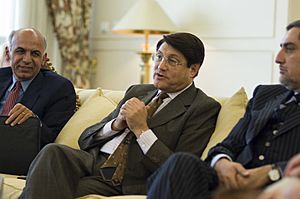
In 2009, Abdullah ran for president as an independent candidate against the current president, Hamid Karzai. Abdullah came in second place. Because no candidate won more than 50% of the votes, a second round of voting was planned. However, Abdullah decided to withdraw from the second round. He said he did not believe the government could hold a fair election. As a result, Hamid Karzai was declared the winner.
After the 2009 election, Abdullah started a political group called the Coalition for Change and Hope. This group later became the National Coalition of Afghanistan in 2011. It was a main opposition group against the government.
In 2014, Abdullah ran for president again. He received the most votes in the first round, and then went to a second round against Ashraf Ghani. There were many arguments about the results of the second round, with claims of fraud. After months of talks and help from the United States, Abdullah and Ghani agreed to form a national unity government. In this government, Ghani became president, and Abdullah took on a new important role as the Chief Executive of Afghanistan.
Chief Executive (2014–2020)
As Chief Executive, Abdullah worked to bring in foreign investments and support for Afghanistan. He also tried to arrange ceasefires with the Taliban. He believed that the Taliban could not be fully trusted for long-term peace.
In 2019, Abdullah ran for president for a third time. After the election results showed Ashraf Ghani as the winner, Abdullah also declared himself the winner. This caused a political problem, and both Abdullah and Ghani held separate swearing-in ceremonies. With pressure from other countries, they eventually reached a deal. This deal allowed President Ghani to keep his executive power. It also created the High Council of National Reconciliation, which Abdullah was chosen to lead. His job was to lead peace efforts with the Taliban.
High Council for National Reconciliation (2020–2021)
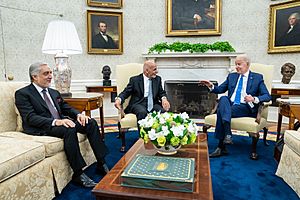
On 17 May 2020, Abdullah became the chairman of the High Council for National Reconciliation (HCNR). This council was given the job of handling all matters related to the Afghan peace process. The council held its first meeting in December 2020.
In August 2021, the Afghan government collapsed as the Taliban took control of Kabul. After this, Abdullah met with other leaders to discuss the future of Afghanistan. In February 2022, Abdullah was temporarily placed under house arrest by the Taliban. He was later allowed to travel to India in May 2022 to visit his family. He returned to Afghanistan in June 2022.
Images for kids
See also
 In Spanish: Abdullah Abdullah para niños
In Spanish: Abdullah Abdullah para niños
 | Delilah Pierce |
 | Gordon Parks |
 | Augusta Savage |
 | Charles Ethan Porter |


